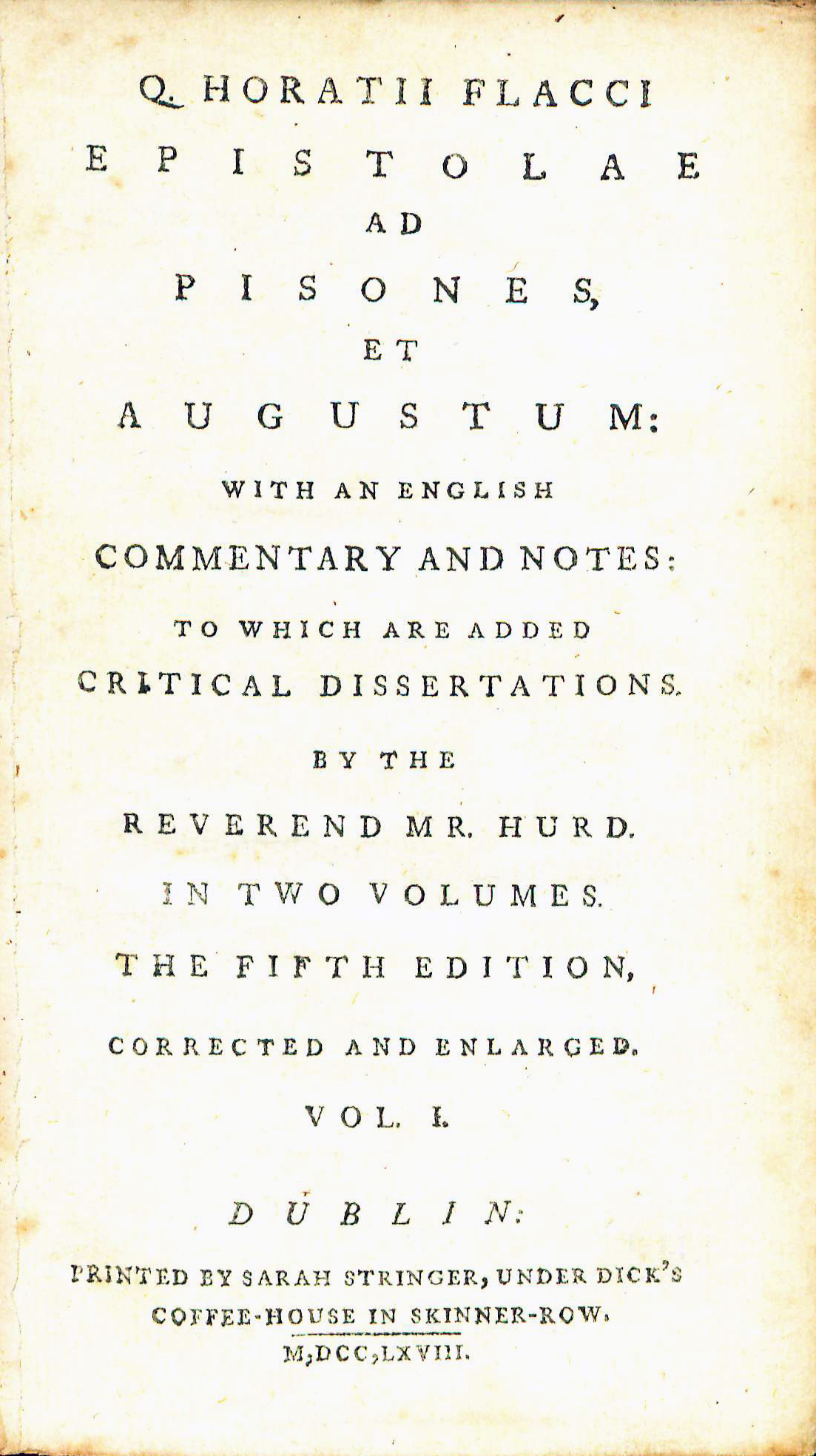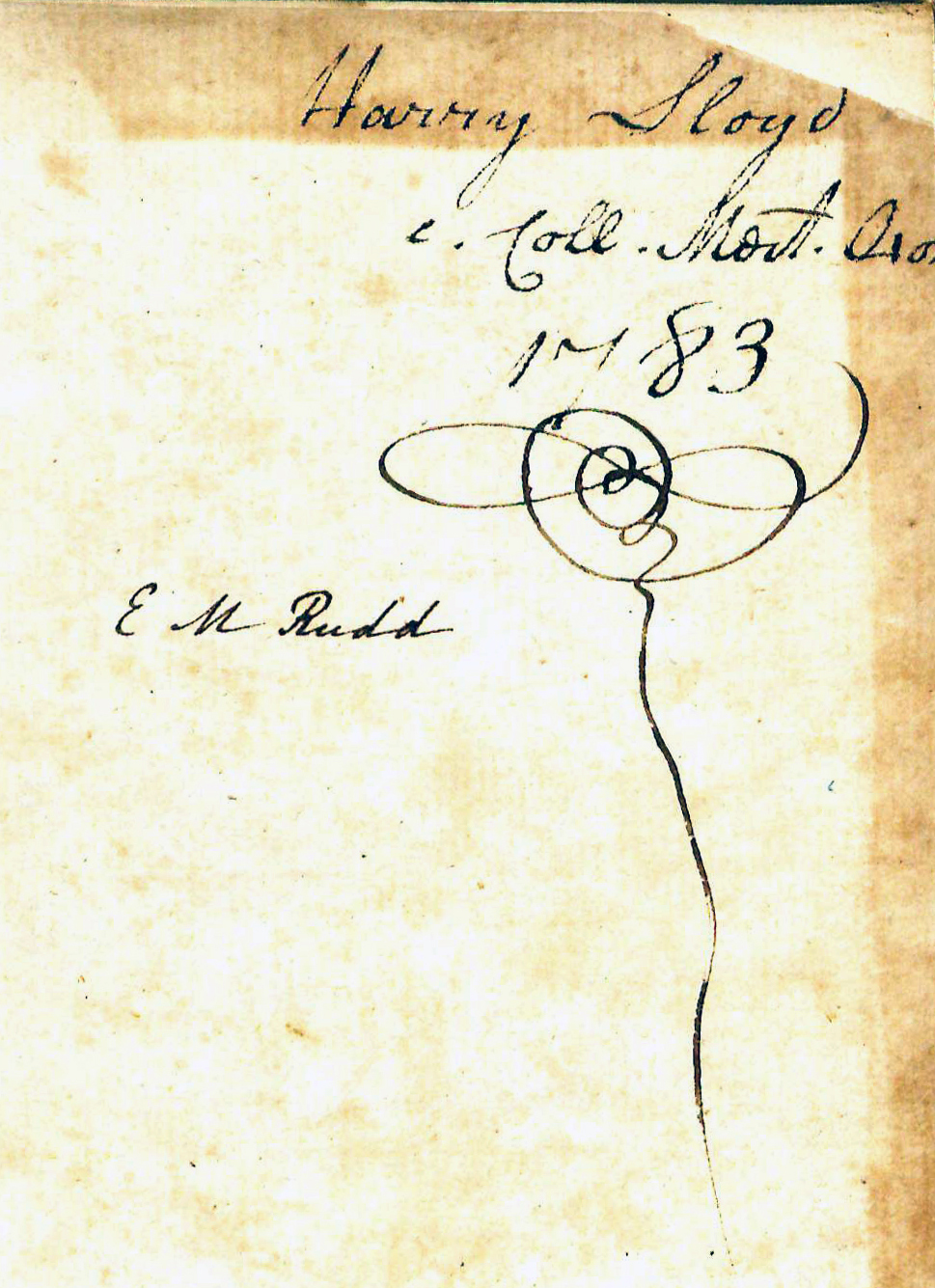Q. Horatii Flacci Epistolae ad Pisones, et Augustum with an English Commentary and Notes
by Horace
| Epistles to the Pisos and Augustus | |
|
Title page from Q. Horatii Flacci Epistolae ad Pisones, George Wythe Collection, Wolf Law Library, College of William & Mary. | |
| Author | Horace |
| Editor | Richard Hurd |
| Published | Dublin: Printed by Sarah Stringer, under Dick's Coffee House in Skinner's Row |
| Date | 1768 |
| Edition | 5th edition, corrected and enlarged |
| Language | Latin with English commentary |
| Volumes | 2 volume set |
| Desc. | 12mo (19 cm) |
| Location | Shelf J-4 |
Horace Quintus Horatius “Horace” Flaccus (65 BCE–8 CE) was a Roman poet about whom modern scholars actually have a good deal of information due to his own testimony and a biography by Suetonius.[1] He is unique in that all of his published works survive to this day.[2] Horace’s father was a freeman (a former slave) who became a successful public auctioneer, enabling Horace to go to Rome and Athens for an upper-class education.[3] Horace was in Athens when the Roman civil war broke out after Julius Caesar’s assassination in 44 BCE, and from there he joined Brutus’ army as a military tribune from 44 to 41 BCE when (he says) he ran away from the Battle of Philippi. He “counted himself lucky to be able to return to Italy, unlike many of his comrades-in-arms,” and was accepted into a circle of writers including Maecenas, who later gave him a farm thereby securing his financial position. This security gave Horace leisure time to work on poetry (which was vastly impacted by the Sabine region in which his farm was located) and maintain his personal freedom. He declined close relationships that might commit him to others, including an influential post offer by the Emperor Augustus.[4] Though Horace treasured his privacy, he maintained a close friendship with Maecenas for thirty years and died several months after him without having ever married. [5]
This set includes letters to the Piso family and to the Emperor Augustus, two pieces from Horace's second book of epistles published in 14 BCE.[6] The "Epistola ad Pisones," more popularly known as "Ars Poetica" ("The Art of Poetry"), significantly influenced subsequent poetry and criticism.[7] In the "Epistola ad Augustum", Horace critiques the work of earlier poets as "deficient in taste" and laments the appeal of such authors to contemporary readers.[8] Richard Hurd, Bishop of Lichfield and Coventry, later Bishop of Worcester, edited the letters and added English commentary. Through his work on this edition, Hurd gained the patronage of the influential Bishop of Gloucester, William Warburton,[9] to whom the work is dedicated.
Evidence for Inclusion in Wythe's Library
Thomas Jefferson included "Hurd's Horace. 2.v. 12mo." in his inventory of Wythe's Library in the section of titles he kept for himself. Both Brown's Bibliography[10] and George Wythe's Library[11] on LibraryThing list the 1768 edition published in Dublin based on the copy Jefferson sold to the Library of Congress.[12] This volume does not survive. The Wolf Law Library purchased a copy of the 1768 edition.
Description of the Wolf Law Library's copy
Bound in contemporary calf; banded spines include gilt volume numbers. Both volumes include the armorial bookplate of (J?) Johnstone with the motto "Nun quam non paratus" (Never unprepared) on the front pastedown. Volume two bookplate also signed "Harry Lloyd, Worcester." Both volumes also include the inscription, "Harry Lloyd, e. Coll. Mort. Oxon, 1783" and the signature of "E M Rudd" on the front free endpaper.
Images of the library's copy of this book are available on Flickr. View the record for this book in William & Mary's online catalog.


